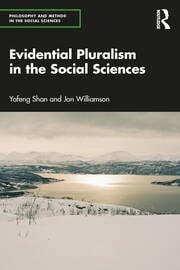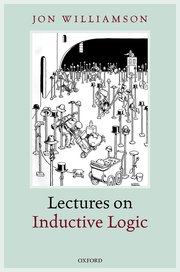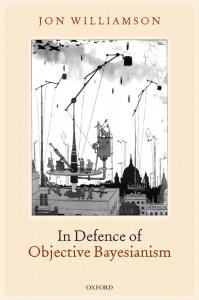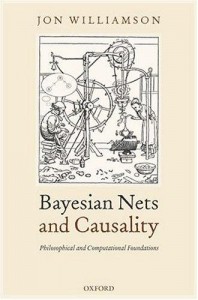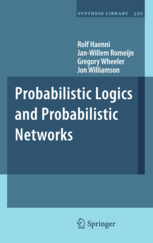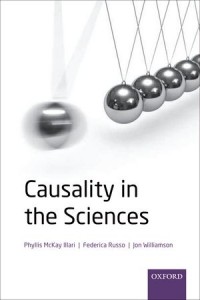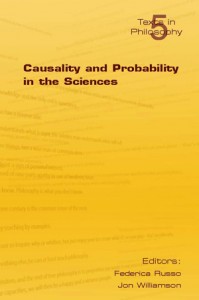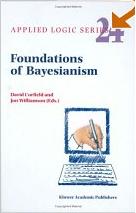Monographs
- Yafeng Shan and Jon Williamson: Evidential Pluralism in the Social Sciences, Routledge 2023.


- Veli-Pekka Parkkinen, Christian Wallmann, Michael Wilde, Brendan Clarke, Phyllis Illari, Michael P. Kelly, Charles Norell, Federica Russo, Beth Shaw and Jon Williamson: Evaluating evidence of mechanisms in medicine: Principles and procedures, Springer, 2018.

 Reviews: Lise Marie Anderson & Jesper Nørgaard Kjær, Adam La Caze
Reviews: Lise Marie Anderson & Jesper Nørgaard Kjær, Adam La Caze - Jon Williamson: Lectures on inductive logic, Oxford University Press, 2017. Errata.
- Rolf Haenni, Jan-Willem Romeijn, Gregory Wheeler & Jon Williamson: Probabilistic logics and probabilistic networks, Synthese Library, Springer, 2011.
- Jon Williamson: In defence of objective Bayesianism, Oxford University Press, 2010.
- Jon Williamson: Bayesian nets and causality: philosophical and computational foundations, Oxford University Press, 2005. Preface, Reviews & Errata
Collections
- Alan Love, Caterina Marchionni, Miklos Redei & Jon Williamson (eds): EPSA21: Selected papers from the biennial conference in Turin, European Journal for the Phiosophy of Science, 2023.
- Yafeng Shan & Jon Williamson (eds): Evidential Diversity in the Social Sciences, Synthese Topical Collection, 2022.
- Jon Williamson (ed.): Focus on Evidential Pluralism, The Reasoner 15(6), 2021.


- Juergen Landes & Jon Williamson (eds): Combining probability and logic, Journal of Applied Logic 14, March 2016.
- Juergen Landes & Jon Williamson (eds): Maximum Entropy Applied to Inductive Logic and Reasoning, Entropy journal, 2015.
- Phyllis McKay Illari, Federica Russo & Jon Williamson (eds): Causality in the sciences, Oxford University Press, [Amazon UK US], 2011, Summary Page
- Jon Williamson & Federica Russo (eds): Key terms in logic, Continuum, 2010.
- Fabio Cozman, Rolf Haenni, Jan-Willem Romeijn, Federica Russo, Gregory Wheeler & Jon Williamson (eds): Combining probability and logic, Special Issue, Journal of Applied Logic7(2), 2009; Editorial:

- Federica Russo & Jon Williamson (eds): Causality and probability in the sciences, London: College Publications, Texts in Philosophy Series, 2007. Introduction:
 , Buy: UK, US, Summary Page
, Buy: UK, US, Summary Page - Jon Williamson (ed.): Combining probability and logic, Special Issue, Journal of Logic, Language and Information 15(1-2), 2006; Introduction:


- Jon Williamson & Dov Gabbay (eds): Combining probability and logic, Special Issue, Journal of Applied Logic 1(3-4), 2003; Editorial, pp. 135-138:


- David Corfield & Jon Williamson (eds): Foundations of Bayesianism, Kluwer Applied Logic Series 2001, Kluwer. Contents & Reviews
Articles
See also What’s New for my latest articles.
Causality, Mechanisms & Scientific DiscoveryDaniel Auker-Howlett and Jon Williamson: Vaccination uptake interventions: an EBM+ approach, Argumenta 7(1): 79-96, 2021. Jon Williamson: Introducing Evidential Pluralism, The Reasoner 15(6): 45-47, 2021. Jon Williamson: Evidential Pluralism and Explainable AI, The Reasoner 15(6): 55-56, 2021. Yafeng Shan and Jon Williamson: Applying Evidential Pluralism to the social sciences, European Journal for the Philosophy of Science 11(4):96, 2021. Jeffrey K. Aronson, Daniel Auker-Howlett, Virginia Ghiara, Michael P. Kelly and Jon Williamson: The use of mechanistic reasoning in assessing coronavirus interventions, Journal of Evaluation in Clinical Practice 27(3): 684-693, 2021. Jon Williamson: The feasibility and malleability of EBM+, Theoria 36(2):191-209, 2021. Jon Williamson: Calibration for epistemic causality, Erkenntnis 86(4):941-960, 2021. Jon Williamson: Establishing the teratogenicity of Zika and evaluating causal criteria, Synthese 198(10): 2505–2518, 2021. Jonathan M Samet, Weihsueh A Chiu, Vincent Cogliano, Jennifer Jinot, David Kriebel, Ruth M Lunn, Frederick A Beland, Lisa Bero, Patience Browne, Lin Fritschi, Jun Kanno, Dirk W Lachenmeier, Qing Lan, Gérard Lasfargues, Frank Le Curieux, Susan Peters, Pamela Shubat, Hideko Sone, Mary C White, Jon Williamson, Marianna Yakubovskaya, Jack Siemiatycki, Paul A White, Kathryn Z Guyton, Mary K Schubauer-Berigan, Amy L Hall, Yann Grosse, Véronique Bouvard, Lamia Benbrahim-Tallaa, Fatiha El Ghissassi, Béatrice Lauby-Secretan, Bruce Armstrong, Rodolfo Saracci, Jiri Zavadil, Kurt Straif & Christopher P Wild: The IARC Monographs: Updated procedures for modern and transparent evidence synthesis in cancer hazard identification, Journal of the National Cancer Institute 112(1):30-37, 2020. Mark R. Tonelli & Jon Williamson: Mechanisms in clinical practice: use and justification, Medicine, Health Care and Philosophy 23:115–124, 2020. Veli-Pekka Parkkinen & Jon Williamson: Extrapolating from model organisms in pharmacology, in La Caze, A., & Osimani, B., (eds), Uncertainty in pharmacology: epistemology, methods, and decisions, Springer, 2020, pp. 59-78. Jon Williamson: Evidential Proximity, Independence, and the evaluation of carcinogenicity, Journal of Evaluation in Clinical Practice 25(6):955-961, 2019. Jon Williamson: Establishing causal claims in medicine, International Studies in the Philosophy of Science 32(1): 33-61, 2019. Jeffrey K. Aronson, Adam La Caze, Michael P. Kelly, Veli-Pekka Parkkinen and Jon Williamson: The use of mechanistic evidence in drug approval, Journal of Evaluation in Clinical Practice 24(5):1166-1176, 2018. Jan-Willem Romeijn & Jon Williamson: Intervention and Identifiability in Latent Variable Modelling, Minds and Machines 28(2):243-254, 2018. Jon Williamson: Models in systems medicine, Disputatio, 9(47):429-469, 2017. Michael Wilde & Jon Williamson: Models in medicine, in H. Kincaid, J. Simon & M. Solomon (eds), The Routledge Companion to Philosophy of Medicine. Routledge, pp. 271-284, 2016. Michael Wilde & Jon Williamson: Evidence and Epistemic Causality, in A. von Eye & W. Wiedermann (eds), Statistics and Causality: methods for applied empirical research, pp. 31-41. Wiley, 2016. Brendan Clarke, Donald Gillies, Phyllis Illari, Federica Russo & Jon Williamson: Mechanisms and the Evidence Hierarchy, Topoi 33(2):339-360, 2014. Brendan Clarke, Bert Leuridan & Jon Williamson: Modelling mechanisms with causal cycles, Synthese 191(8):1651-1681, 2014. Jon Williamson: How can causal explanations explain? Erkenntnis 78:257-275, 2013. Brendan Clarke, Donald Gillies, Phyllis Illari, Federica Russo & Jon Williamson: The evidence that evidence-based medicine omits, Preventative Medicine 57:745-747, 2013. Phyllis McKay Illari and Jon Williamson: In defence of activities, Journal of General Philosophy of Science, 44(1):69-83, 2013. Federica Russo & Jon Williamson: EnviroGenomarkers: the interplay between mechanisms and difference making in establishing causal claims, Medicine Studies: International Journal for the History, Philosophy and Ethics of Medicine & Allied Sciences, 3:249–262, 2012. Phyllis McKay Illari and Jon Williamson: What is a mechanism: thinking about mechanisms across the sciences, European Journal for Philosophy of Science 2:119-135, 2012; Jon Williamson: Mechanistic theories of causality, Philosophy Compass 6(6): 421-432, 433-444, 445-447, 2011; Part 1: Phyllis McKay Illari and Jon Williamson: Mechanisms are real and local, in Phyllis McKay Illari, Federica Russo and Jon Williamson (eds): Causality in the Sciences, Oxford University Press, pp. 818-844, 2011; Federica Russo and Jon Williamson: Epistemic causality and evidence-based medicine, History and Philosophy of the Life Sciences 33(4):563-582, 2011. Lorenzo Casini, Phyllis McKay Illari, Federica Russo and Jon Williamson: Models for prediction, explanation and control: recursive Bayesian networks, Theoria 26(1):5-33, 2011. Barbara Osimani, Federica Russo and Jon Williamson: Scientific evidence and the law: an objective Bayesian formalisation of the precautionary principle in pharmaceutical regulation, Journal of Philosophy, Science and Law 11, 2011; George Darby and Jon Williamson: Imaging Technology and the Philosophy of Causality, Philosophy and Technology 24(2): 115-136, 2011. Federica Russo and Jon Williamson: Generic versus single-case causality: the case of autopsy, European Journal for Philosophy of Science 1(1): 47-69, 2011. Phyllis McKay Illari and Jon Williamson: Function and organization: comparing the mechanisms of protein synthesis and natural selection, Studies in History and Philosophy of Biological and Biomedical Sciences 41, pp. 279-291, 2010, doi 10.1016/j.shpsc.2010.07.001; Jon Williamson: The philosophy of science and its relation to machine learning, in Mohamed Medhat Gaber (ed.): Scientific Data Mining and Knowledge Discovery: Principles and Foundations, Springer, pp. 77-89, 2010. Lorenzo Casini, Phyllis McKay Illari, Federica Russo and Jon Williamson: Recursive Bayesian networks for prediction, explanation and control in cancer science: a position paper, Proceedings of the First International Conference on Bioinformatics, Valencia, 20-23 January 2010; Jon Williamson: Probabilistic theories [of causality], in Helen Beebee, Chris Hitchcock & Peter Menzies (eds): The Oxford Handbook of Causation, Oxford University Press, pp. 185-212, 2009; Jon Williamson: Causality, in Dov Gabbay & F. Guenthner (eds.): Handbook of Philosophical Logic, volume 14, Springer, pp. 95-126, 2007; Federica Russo and Jon Williamson: Interpreting causality in the health sciences, International Studies in the Philosophy of Science 21(2): 157-170, 2007. Federica Russo and Jon Williamson: Interpreting probability in causal models for cancer, in Federica Russo and Jon Williamson (eds): Causality and probability in the sciences, London: College Publications, 2007, pp. 217-241. Jon Williamson: Causal pluralism versus epistemic causality, Philosophica 77(1), pp. 69-96, 2006; Jon Williamson: Dispositional versus epistemic causality, Minds and Machines 16, pp. 259-276, 2006; Jon Williamson & Dov Gabbay: Recursive Causality in Bayesian Networks and Self-Fibring Networks, in Donald Gillies (ed.): `Laws and models in science‘, London: King’s College Publications, 2005, pp. 173-221, with comments pp. 223-245. Jon Williamson: A dynamic interaction between machine learning and the philosophy of science, Minds and Machines 14(4), 2004, pp. 539-549; Jon Williamson: Learning causal relationships, Discussion Paper 02/02, LSE Centre for Natural and Social Sciences;
|
Probability, Logic & Formal EpistemologyJuergen Landes, Soroush Rafiee Rad and Jon Williamson: Towards the Entropy-Limit Conjecture, Annals of Pure and Applied Logic 172(2):102870, 2021. Juergen Landes, Christian Wallmann and Jon Williamson: The Principal Principle, admissibility, and normal informal standards of what is reasonable, European Journal for the Philosophy of Science 11(2):36, 2021. Christian Wallmann and Jon Williamson: The Principal Principle and subjective Bayesianism, European Journal for the Philosophy of Science 10(1):3, 2020. Jon Williamson: Justifying the principle of indifference, European Journal for the Philosophy of Science 8:559-586, 2018. Jim Hawthorne, Juergen Landes, Christian Wallmann & Jon Williamson: The Principal Principle implies the Principle of Indifference, British Journal for the Philosophy of Science. 68:123–131, 2017. Christian Wallmann & Jon Williamson: Four approaches to the reference class problem, in Gábor Hofer-Szabó & Leszek Wroński (eds), Making it Formally Explicit: Probability, Causality and Indeterminism, Springer, 2017, pp. 61-81. Michael Wilde & Jon Williamson: Bayesianism and information, in L. Floridi (ed.), The Routledge Handbook of Philosophy of Information, pp. 180-187, Routledge 2016. Juergen Landes & Jon Williamson: Objective Bayesian nets from consistent datasets, in Adom Giffin & Kevin H. Knuth (eds), Proceedings of the 35th International Workshop on Bayesian Inference and Maximum Entropy Methods in Science and Engineering, Potsdam NY. American Institute of Physics Conference Proceedings 1757, 2016. Jon Williamson: Deliberation, Judgement and the Nature of Evidence, Economics and Philosophy 31(1): 27-65, 2015. Juergen Landes & Jon Williamson: Justifying Objective Bayesianism on Predicate Languages, Entropy 17: 2459-2543, 2015; Jon Williamson: How uncertain do we need to be? Erkenntnis 79(6):1249-1271, 2014. Published version: Jürgen Landes & Jon Williamson: Objective Bayesianism and the Maximum Entropy Principle, Entropy 15(9): 3528-3591, 2013. Jon Williamson: Why Frequentists and Bayesians Need Each Other, Erkenntnis 78:293-318, 2013. Jon Williamson: From Bayesian epistemology to inductive logic, Journal of Applied Logic 11:468-486, 2013. Jon Williamson: Review of ‘Reliable Reasoning’ by Gilbert Harman and Sanjeev Kulkarni, Mind 121:1073-1076, 2013. Jon Williamson: Calibration and Convexity: Response to Gregory Wheeler, British Journal for the Philosophy of Science 63:851-857, 2012. Jon Williamson: Inductive logic, The Reasoner 6(11):176-7, 2012. Jon Williamson: Objective Bayesianism, Bayesian conditionalisation and voluntarism, Synthese, 178(1): 67-85, 2011; Jon Williamson: An objective Bayesian account of confirmation, in Dennis Dieks, Wenceslao J. Gonzalez, Stephan Hartmann, Thomas Uebel, Marcel Weber (eds), `Explanation, Prediction, and Confirmation. New Trends and Old Ones Reconsidered’, The philosophy of science in a European perspective Volume 2, Springer, 2011, pp. 53-81; Gregory Wheeler & Jon Williamson: Evidential probability and objective Bayesian epistemology, in Prasanta S. Bandyopadhyay & Malcolm R.Forster (eds): Philosophy of statistics, Handbook of the Philosophy of Science volume 7, Elsevier, pp. 307-331, 2011. Jon Williamson: Bruno de Finetti: Philosophical lectures on probability, Philosophia Mathematica 18(1): 130-135, 2010; Jon Williamson: Epistemic complexity from an objective Bayesian perspective, in A. Carsetti (ed.) `Causality, meaningful complexity and embodied cognition’, Springer, pp. 231-246, 2010; Jan-Willem Romeijn, Rolf Haenni, Gregory Wheeler and Jon Williamson: Logical Relations in a Statistical Problem, in B. Lowe, E. Pacuit & J.W. Romeijn (eds): Foundations of the Formal Sciences VI, Reasoning about Probabilities and Probabilistic Reasoning, London: College Publications, pp. 49-79, 2009. Jon Williamson: Aggregating judgements by merging evidence, Journal of Logic and Computation 19(3), pp. 461-473, 2009. Jon Williamson: Philosophies of probability, in Andrew Irvine (ed.): Handbook of the Philosophy of Mathematics, Volume 4 of the Handbook of the Philosophy of Science, North-Holland, 2009, pp. 493–533; Jon Williamson: Objective Bayesianism with predicate languages, Synthese 163(3), pp. 341-356, 2008; Rolf Haenni, Jan-Willem Romeijn, Gregory Wheeler and Jon Williamson: Possible Semantics for a Common Framework of Probabilistic Logics, in V. N. Huynh (ed.): Interval / Probabilistic Uncertainty and Non-Classical Logics, Advances in Soft Computing Series, Springer 2008, pp. 268-279. Jon Williamson: A note on probabilistic logics and probabilistic networks, The Reasoner 2(5), pp. 4-5, 2008. Jon Williamson: Objective Bayesian probabilistic logic, Journal of Algorithms in Cognition, Informatics and Logic 63: 167-183, 2008. Sylvia Nagl, Matt Williams and Jon Williamson: Objective Bayesian nets for systems modelling and prognosis in breast cancer, in Dawn Holmes and L.C. Jain (eds): `Innovations in Bayesian Networks: Theory and Applications’, Springer, 2008, pp. 131-167. Jon Williamson: Inductive influence, British Journal for the Philosophy of Science 58, pp. 689-708, 2007; Jon Williamson: Motivating objective Bayesianism: from empirical constraints to objective probabilities, in William L. Harper and Gregory R. Wheeler (eds.): Probability and Inference: Essays in Honor of Henry E. Kyburg Jr. London: College Publications, 2007, pp. 155-183; Sylvia Nagl, Matt Williams, Nadjet El-Mehidi, Vivek Patkar and Jon Williamson: Objective Bayesian nets for integrating cancer knowledge: a systems biology approach, in Juho Rousu, Samuel Kaski and Esko Ukkonen (eds): Proceedings of the Workshop on Probabilistic Modeling and Machine Learning in Structural and Systems Biology (Tuusula, Finland, 17-18 June 2006), Helsinki University Printing House, 2006, pp. 44-49. Video. Matt Williams and Jon Williamson: Combining argumentation and Bayesian nets for breast cancer prognosis, Journal of Logic, Language and Information 15: 155-178, 2006. Jon Williamson: From Bayesianism to the Epistemic View of Mathematics: Remarks motivated by Richard Jeffrey’s ‘Subjective probability: the real thing’, Philosophia Mathematica 14(3), pp. 365-369, 2006; Jon Williamson: Objective Bayesian nets, in S. Artemov, H. Barringer, A. S. d’Avila Garcez, L. C. Lamb, and J. Woods (eds.): We Will Show Them: Essays in Honour of Dov Gabbay, Vol 2., pp. 713-730, College Publications, 2005; Jon Williamson: Bayesianism and language change, Journal of Logic, Language and Information, 12(1), 2003, pp. 53-97. Jung-Wook Bang, Raphael Chaleil & Jon Williamson: Two-stage Bayesian networks for metabolic network prediction, in Peter Lucas (ed), Proceedings of the Workshop on Qualitative and Model-Based Reasoning in Biomedicine, 9th Conference on Artificial Intelligence in Medicine Europe, 18-22 October 2003, Cyprus, pp. 19-23; Jon Williamson: Review of Lorenzo Magnani [2001]: Abduction, reason and science: processes of discovery and explanation, British Journal for the Philosophy of Science 54(2), 2003, pp.353-358. Jon Williamson: Maximising entropy efficiently, Electronic Transactions in Artificial Intelligence 6, 2002; Jon Williamson: Probability logic, in Dov Gabbay, Ralph Johnson, Hans Jurgen Ohlbach & John Woods (eds)[2002]: Handbook of the Logic of Inference and Argument: The Turn Toward the Practical, Studies in Logic and Practical Reasoning Volume 1, Elsevier, pp. 397-424. Jon Williamson & David Corfield: Bayesianism into the 21st century, in David Corfield & Jon Williamson (eds): `Foundations of Bayesianism‘, Kluwer Applied Logic Series, 2001, pp.1-16. Jon Williamson: Bayesian networks for logical reasoning, in Carla Gomes & Toby Walsh (eds) [2001]: Proceedings of the AAAI Fall Symposium on using Uncertainty within Computation, AAAI Press Technical Report FS-01-04, pp. 136-143. Jon Williamson: Foundations for Bayesian networks , in David Corfield & Jon Williamson (eds): Foundations of Bayesianism, Kluwer Applied Logic Series, 2001, pp. 75-115. Presented at Bayesianism 2000 (May 11-12 2000). Jon Williamson: A probabilistic approach to diagnosis, Proceedings of the Eleventh International Workshop on Principles of Diagnosis (DX-00), Morelia, Michoacen, Mexico, June 8-11 2000. Jon Williamson: Approximating discrete probability distributions with Bayesian networks, in Proceedings of the International Conference on Artificial Intelligence in Science and Technology, Hobart Tasmania, 16-20 December 2000. Jon Williamson: Countable additivity and subjective probability, British Journal for the Philosophy of Science 50(3), 1999, pp. 401-416.
|
